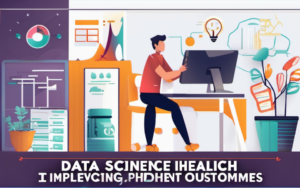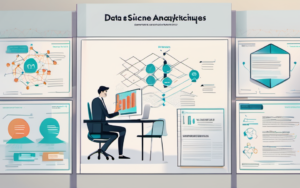The world is awash in data, and machine learning is the key to unlocking its hidden potential. It’s a powerful tool that allows computers to learn from data without explicit programming, enabling them to make predictions, automate tasks, and solve complex problems. But how does it relate to the broader field of data science?
What is Machine Learning?
Definition and Core Concepts
At its core, machine learning is a branch of artificial intelligence (AI) that focuses on building systems that can learn from data and improve their performance over time. These systems use algorithms to identify patterns, make predictions, and generate insights from vast amounts of information.
Think of it as teaching a computer to learn like a human child. You provide examples, the computer analyzes them, and gradually it develops the ability to understand and respond to new situations.
Types of Machine Learning
Machine learning can be categorized into three main types:
Supervised Learning
In supervised learning, the algorithm is trained on a labeled dataset, where each input is associated with a known output. This allows the algorithm to learn the relationship between the inputs and outputs, enabling it to make predictions on new, unseen data.
For example, training a model to predict house prices based on historical data would be a supervised learning task.
Unsupervised Learning
Unsupervised learning, on the other hand, deals with unlabeled data. The algorithm is tasked with finding patterns and structures within the data without any prior knowledge of the desired outcome.
Clustering, where the algorithm groups similar data points together, is a common example of unsupervised learning.
Reinforcement Learning
Reinforcement learning involves training an agent to make decisions in an environment by rewarding desirable actions and punishing undesirable ones. The agent learns through trial and error, optimizing its behavior over time.
Game-playing AI, such as AlphaGo, is a prime example of reinforcement learning.
Applications of Machine Learning
Machine learning is transforming countless industries, from healthcare and finance to e-commerce and entertainment. Some notable applications include:
- Predictive analytics: forecasting future trends and behaviors.
- Recommendation systems: suggesting products, content, or services based on user preferences.
- Fraud detection: identifying suspicious transactions and patterns.
- Image and speech recognition: enabling machines to understand and interpret visual and audio data.
Data Science and Machine Learning: A Symbiotic Relationship
Data science and machine learning are closely intertwined, forming a powerful partnership for extracting valuable insights from data.
Data Science: The Foundation
Data science encompasses a broader set of techniques and processes for collecting, cleaning, transforming, and analyzing data. It involves understanding the business context, identifying relevant data sources, and preparing the data for analysis.
Think of data science as building the foundation upon which machine learning can be built.
Machine Learning: The Engine
Machine learning provides the tools and algorithms to analyze the data that data scientists have prepared. It allows for automated learning, prediction, and decision-making, enabling data scientists to generate insights that would be impossible to achieve manually.
Machine learning is the engine that drives the analysis and unlocks the potential of the data.
How They Work Together
Data science and machine learning work hand-in-hand to solve real-world problems. Data scientists gather, clean, and prepare the data, while machine learning algorithms analyze it to discover patterns, generate insights, and make predictions. This collaborative process empowers organizations to make better decisions, optimize processes, and create new products and services.
Examples of Machine Learning in Data Science
Machine learning plays a crucial role in various data science projects, enabling the development of intelligent solutions.
Predictive Analytics
Machine learning is widely used for predictive analytics, such as forecasting sales, predicting customer churn, or assessing credit risk. By identifying patterns and trends in historical data, machine learning algorithms can predict future outcomes with a high degree of accuracy.
For example, a retail company might use machine learning to predict which products are likely to sell well in the coming months, enabling them to optimize inventory and adjust pricing strategies.
Recommendation Systems
Recommender systems, powered by machine learning, are ubiquitous online. These systems use user data and product information to suggest relevant items, movies, music, or articles, enhancing user experience and driving engagement.
Think about the recommendations you see on Amazon or Netflix – those are often powered by machine learning algorithms that analyze your past behavior and preferences.
Image and Speech Recognition
Machine learning algorithms are transforming how we interact with technology, enabling machines to “understand” images and speech. Image recognition is used in facial recognition systems, medical imaging analysis, and self-driving cars. Speech recognition powers voice assistants like Siri and Alexa.
Machine learning is enabling computers to interpret and process information from the real world, paving the way for more intuitive and natural human-computer interactions.
The Future of Machine Learning and Data Science
The future of machine learning and data science is bright, filled with exciting advancements and transformative applications.
Emerging Trends
- Deep learning: A powerful type of machine learning inspired by the structure and function of the human brain, enabling computers to learn from complex and unstructured data.
- Natural language processing (NLP): Allowing computers to understand and process human language, leading to advancements in chatbots, language translation, and text analysis.
- Edge computing: Bringing data processing and analysis closer to the source, enabling real-time insights and faster decision-making.
Impact on Industries
Machine learning and data science are poised to revolutionize virtually every industry. From healthcare, where they are used for disease diagnosis and drug discovery, to finance, where they are powering algorithmic trading and risk management, these technologies are transforming how businesses operate and deliver value.
Ethical Considerations
As machine learning becomes increasingly powerful, it is crucial to address the ethical implications. Bias in data, privacy concerns, and the potential for misuse are important issues that need careful consideration and responsible development practices.
The future of machine learning and data science holds tremendous promise, but it is essential to embrace these technologies ethically and responsibly to ensure they benefit society as a whole.




